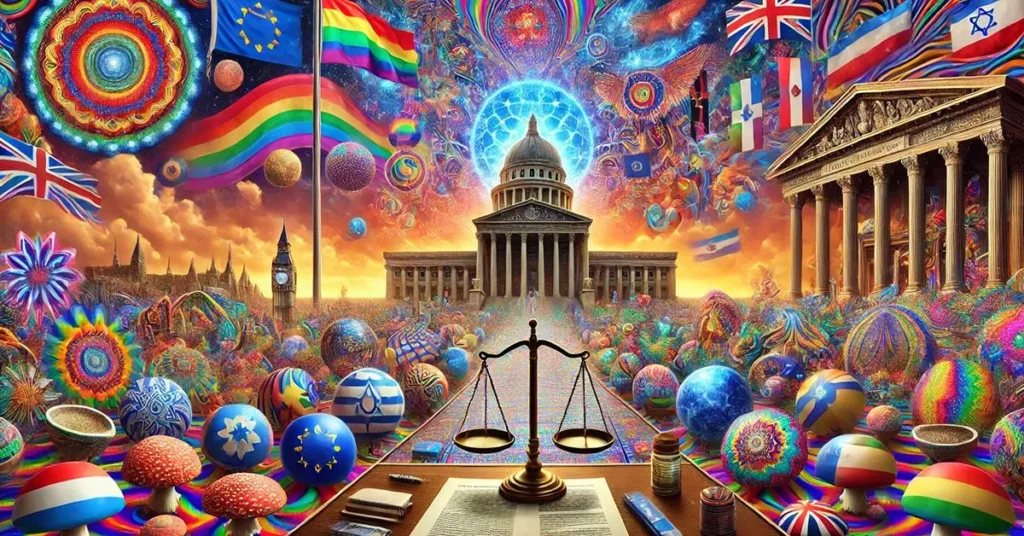The conversation around psychedelic mushrooms, commonly known as magic mushrooms, has intensified in recent years, with debates centering on their legality, therapeutic potential, and societal impact. This article dives into the current legal status of psychedelic mushrooms and where the future is heading.
What are Psychedelic Mushrooms?
Psychedelic mushrooms contain psilocybin, a naturally occurring psychedelic compound. Psilocybin is known for its ability to produce profound alterations in consciousness and perception among users. Research suggests that psychedelic mushrooms have been used for millennia, with historical evidence indicating their use in religious and spiritual rituals.
Legal Status Around the World
United States
In the United States, psilocybin is classified as a Schedule I drug under the Controlled Substances Act, which denotes substances with no currently accepted medical use and a high potential for abuse. However, recent movements and research initiatives suggest a shift in perception toward the potential benefits of psilocybin, particularly in therapeutic settings.
Several cities have decriminalized the possession of small amounts of psychedelic mushrooms, including Denver, Oakland, and Santa Cruz. In 2020, Oregon became the first state to not only decriminalize psilocybin but also to legalize it for therapeutic use under regulated conditions. This pioneering law permits licensed service providers to administer psilocybin in a controlled setting, a significant deviation from the federal stance.
International Perspective
Internationally, the legal status of psychedelic mushrooms varies significantly. In Brazil, for instance, the sale and possession of psilocybin are illegal, yet the possession and cultivation of the mushrooms themselves are not regulated. The Netherlands presents a unique case where psilocybin mushrooms are illegal, but “truffles” – which contain the same psychoactive compounds – are legal and regulated.
In contrast, countries like Indonesia and Japan have stringent laws against psilocybin, with severe penalties for possession and sale, reflecting a global disparity in drug policy.
Therapeutic Potential and Research
A growing body of research highlights the therapeutic benefits of psilocybin. Studies from institutions like Johns Hopkins University have demonstrated promising results in treating depression, PTSD, and anxiety, particularly anxiety associated with life-threatening diseases like cancer. The FDA has designated psilocybin as a “breakthrough therapy” for depression to expedite research, acknowledging its potential significant benefits over existing treatments.
Public Perception and Societal Impact
Public perception of psychedelic mushrooms is evolving. Surveys indicate a shift towards greater acceptance, influenced by increasing awareness of research findings and dissatisfaction with traditional mental health treatments. However, concerns remain regarding the psychological risks associated with psilocybin, such as the potential for triggering psychotic episodes in vulnerable individuals.
Legal Challenges and Future Directions
The primary legal challenge is the discrepancy between state and federal laws in the U.S., which creates confusion and uncertainty, particularly regarding implementing state laws like Oregon’s psilocybin program. The future likely holds more decriminalization and legalization efforts, particularly as research continues to substantiate the therapeutic claims of psilocybin.
Conclusion
The legal landscape for psychedelic mushrooms is complex and rapidly evolving. As research progresses and public attitudes shift, changes in legislation are likely to continue, reflecting a broader reevaluation of drug policies. The therapeutic potential of psilocybin offers a compelling argument for rethinking its legal status, suggesting a future where psychedelic therapies are both accessible and regulated.Those who wish to keep current on the latest legalization initiatives state-by-state may find the psychedelic laws tracker an invaluable resource in monitoring the quickly evolving legislation.
Additional Sources:
- “Controlled Substances Act,” U.S. Drug Enforcement Administration.
- “Psilocybin Fast Track,” U.S. Food and Drug Administration.
- Johns Hopkins Medicine, “Studies Show Promise for Psychedelically Assisted Therapy.”
- “Psilocybin for Treatment-Resistant Depression,” Nature.
- “Global Drug Survey,” Global Drug Policy Observatory.
The legal status, research findings, and public perceptions of psychedelic mushrooms continue to develop. This overview provides a snapshot of the current state of affairs as of May 2024, drawing on reputable sources to paint a comprehensive picture of the complexities surrounding psychedelic mushrooms.

